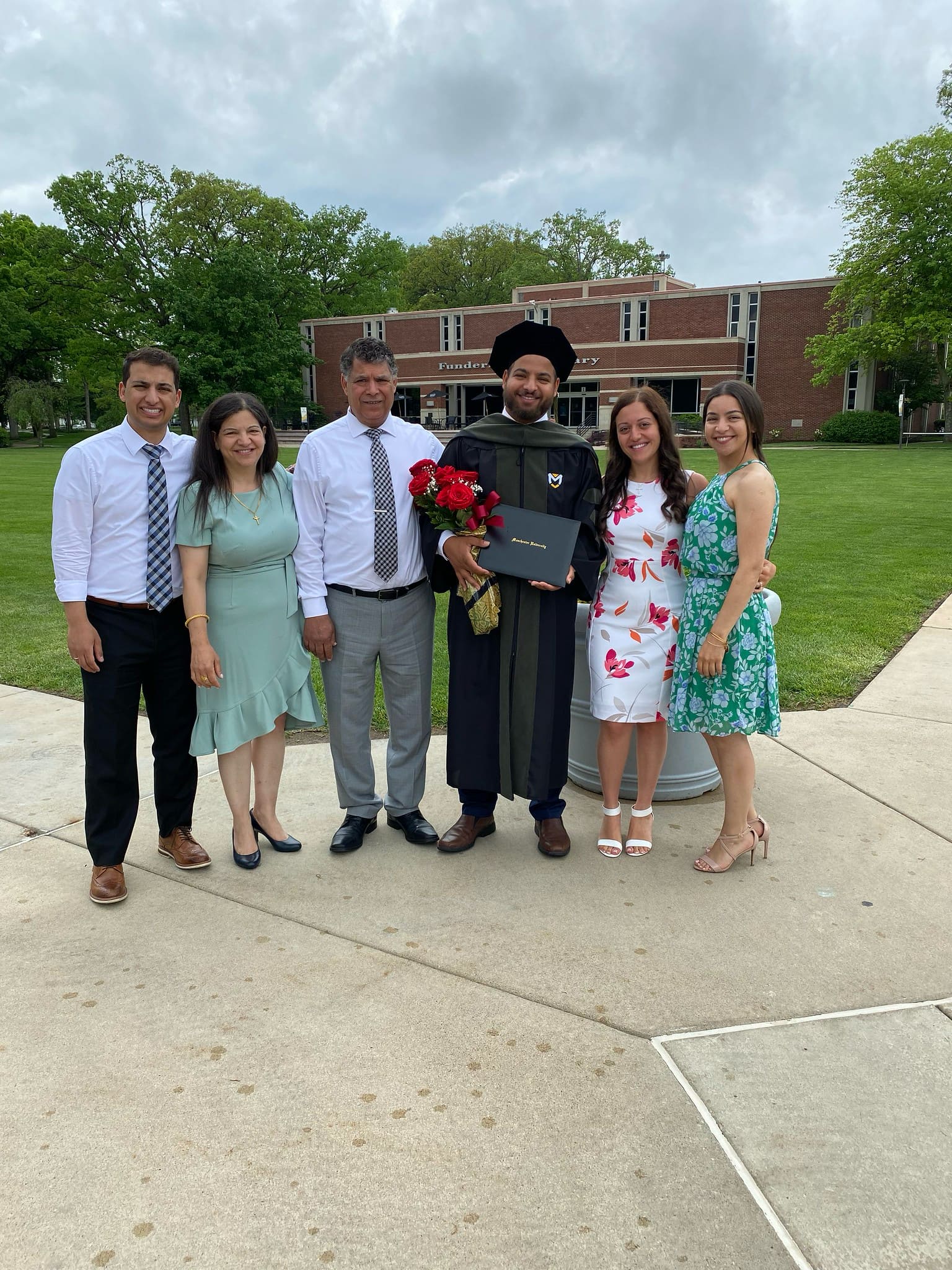Interdisciplinary Major
Explore your passions across multiple fields with Manchester University’s interdisciplinary studies program. Customize your own major or choose from themed tracks like environmental or gender studies.

Customize Your Future With Interdisciplinary Studies
Manchester University’s interdisciplinary studies program is designed for students who want to combine multiple fields of interest into one personalized degree. Whether you choose to create your own individualized major or pursue a pre-designed interdisciplinary studies track such as Environmental Studies or Gender Studies, this flexible program encourages academic exploration and critical thinking. With support from faculty advisors, you’ll gain the tools to shape your unique academic journey and graduate with an interdisciplinary studies degree that reflects your passions, purpose, and long-term goals.
Program Information:
- Credit Hours Can Vary
Location
- North Manchester
Why Choose MU?

Create a Major That Reflects You
Work Closely with Faculty Mentors
Prepare for a Multidimensional Career
What You Can Do With Your Interdisciplinary Studies Degree
Nonprofit Program Coordinator
Use interdisciplinary studies to design, lead, and evaluate social programs.
Environmental Policy Analyst
Apply interdisciplinary studies to assess ecological issues and policy impact.
Communications Strategist
Leverage interdisciplinary studies to craft messages across industries and platforms.
Public Affairs Consultant
Use interdisciplinary studies to navigate complex civic and governmental issues.

Average Starting Salary for Interdisciplinary Studies Degree Holders
Graduates with an interdisciplinary studies degree can pursue diverse, well-paying careers. According to the U.S. Census Bureau, the median salary for interdisciplinary studies degree holders was $59,000 in 2022. Salaries typically range from $45,000 to $90,000, with top earners exceeding $115,000 depending on role and experience. In major metro areas like Houston, TX, the average salary reaches approximately $72,000. This flexible degree supports careers in education, business, health care, and beyond, offering strong earning potential across industries.

How the Interdisciplinary Studies Program Supports Your Growth
Create a Customized Academic Experience
Gain a Broader Perspective Across Fields
Prepare for Graduate School or Career Flexibility
Student Support and Mentorship
FAQs About Manchester University’s Interdisciplinary Studies Degree
What is an interdisciplinary studies degree?
The interdisciplinary studies option at Manchester University empowers students to collaborate with faculty members and academic advisers to curate a degree plan that integrates upper-division courses across fields like political science, education, humanities, and business. This academic freedom allows students to develop critical thinking skills, problem-solving abilities, and research skills, all of which are essential for today’s evolving job market.
By pursuing interdisciplinary studies, students can meet both academic and career goals through an integrated learning experience. The program is particularly appealing to students who don’t see their ambitions reflected in traditional majors and want the freedom to chart their own educational path. Whether your focus is environmental advocacy or nonprofit leadership, this degree program provides students with the tools needed to thrive in a multidisciplinary, dynamic world.
Who is a good fit for the interdisciplinary studies program at Manchester University?
Students in this program work closely with faculty members to design an individualized interdisciplinary degree, incorporating multiple disciplines into a cohesive course of study. This is particularly valuable for learners who want to tailor their academic journey around complex issues such as sustainability, public health, or social justice—topics that require both critical thinking and cross-functional knowledge.
The interdisciplinary approach appeals to students who value adaptability, creativity, and problem-solving. With guidance from faculty advisers, students build an academic plan that may include upper-division courses, research projects, and real-world applications. This flexibility prepares graduates for diverse career paths and graduate school opportunities.
If you’re passionate about building a curriculum that reflects your identity, values, and career goals, Manchester’s interdisciplinary studies is an excellent fit. It empowers students to think independently, work across boundaries, and graduate with a degree that is as distinctive as they are.
Can I pursue graduate school with an interdisciplinary studies degree?
Students work closely with faculty to ensure their interdisciplinary curriculum includes upper-division courses that match their grad school focus. The ability to craft a targeted course of study allows students to align their undergraduate education with their future goals. For example, a student interested in policy development might blend courses from political science, business, and social sciences, while a student focused on health might combine biology, psychology, and ethics.
Graduate schools often seek applicants who demonstrate intellectual curiosity, adaptability, and a capacity to synthesize knowledge from diverse fields—exactly what interdisciplinary studies students develop. Manchester’s program encourages students to set academic and career objectives early and build a curriculum that supports their long-term trajectory.
In short, if you’re thinking about grad school, the interdisciplinary degree is a smart and strategic foundation.
What careers can I pursue with an interdisciplinary studies degree?
Common career paths for interdisciplinary studies graduates include nonprofit program coordinator, human resources specialist, sustainability officer, communications manager, public policy analyst, and community engagement strategist. These roles often require cross-functional knowledge and the ability to work across disciplinary fields—skills that are central to the interdisciplinary approach.
Students can also explore careers in education, healthcare administration, business development, social advocacy, or even entrepreneurship. The degree program at Manchester provides students with research and critical thinking skills, making them competitive candidates for roles that demand analytical reasoning and leadership. With upper division classes tailored to each student’s chosen focus, the curriculum encourages both depth and breadth.
Manchester’s program offers the flexibility to design a career plan that is relevant, adaptive, and future-focused. Whether your interests lie in environmental policy, digital media, or political science, this degree prepares you to navigate and succeed in today’s complex and ever-evolving workforce.
How do I create my individualized interdisciplinary major at Manchester?
Your interdisciplinary degree proposal should demonstrate academic coherence and meet the standards set by the Undergraduate Curriculum Committee. Advisors and faculty members will support you in choosing upper-division classes that provide depth while maintaining an interdisciplinary structure. You’ll also need to articulate how your degree program prepares you for your desired career path or future grad school plans.
This process empowers students to build a major that reflects their passions, whether that means combining environmental studies and business or linking digital media and education. It’s ideal for students who want to explore complex issues through a tailored, problem-solving approach rather than following a traditional academic route.
The ability to create a personalized program is one of the most empowering aspects of Manchester’s curriculum—and a major advantage for students seeking a nontraditional, impactful education.
Are there existing interdisciplinary programs at Manchester University?
The Environmental Studies program offers three tracks: Technical, Natural History, and Policy. These tracks integrate natural sciences, political science, and philosophy to explore topics such as climate change, resource management, and ecological ethics. Students gain a science degree foundation while analyzing human impact on the environment.
The Gender Studies Minor program examines how gender operates within social, cultural, and historical contexts. Students explore feminism, masculinity, LGBTQ+ studies, and intersecting systems of oppression. This interdisciplinary program blends insights from the humanities, social sciences, and communication studies.
Peace Studies engages students in topics like conflict resolution, human rights, and global justice, combining coursework in political science, history, philosophy, and sociology.
These programs provide students with critical research and thinking skills, and a strong academic base while also offering structured flexibility. If you’re looking to pursue interdisciplinary studies with a clearly defined path, these options offer robust academic and career preparation.
How does an interdisciplinary studies degree prepare me for a changing workforce?
Manchester University’s interdisciplinary studies program encourages students to engage with core courses from multiple academic fields such as business, education, political science, and the humanities. By drawing from diverse disciplines, students develop a problem-solving mindset and learn to analyze complex issues from multiple perspectives—an essential skill in modern workplaces. Whether they are preparing for a science degree focus or a more humanities-based path, the curriculum allows for this flexibility.
The program includes upper-division courses that build depth in selected areas and provide students with opportunities for faculty-guided research and interdisciplinary collaboration. Maintaining a strong overall grade point average is essential, as it reflects academic rigor and readiness for graduate programs or competitive job placements. Advisors work closely with students to ensure their grade point average and course selections align with long-term academic and career goals.
In short, an interdisciplinary degree provides students with a well-rounded education that equips them to adapt and lead in a workforce that increasingly values versatility, innovation, and cross-disciplinary knowledge.
Non-Discrimination in the Admission Process
Manchester University is committed to non-discrimination in campus life. The University does not discriminate on the basis of national origin, ancestry, race, color, age, sex, gender identity or expression, sexual orientation, familial status, religion, disability or veteran status in admissions or any area of campus life, including its educational programs, scholarships and loan awards, residence life programs, athletic programs, extracurricular programs, promotion and tenure policies and practice, and alumni affairs.
Manchester University is committed to carry out the provisions of Section 504 of the Rehabilitation Act of 1973 and the Americans With Disabilities Act, which provide for accessibility of University programs to the physically disabled.





